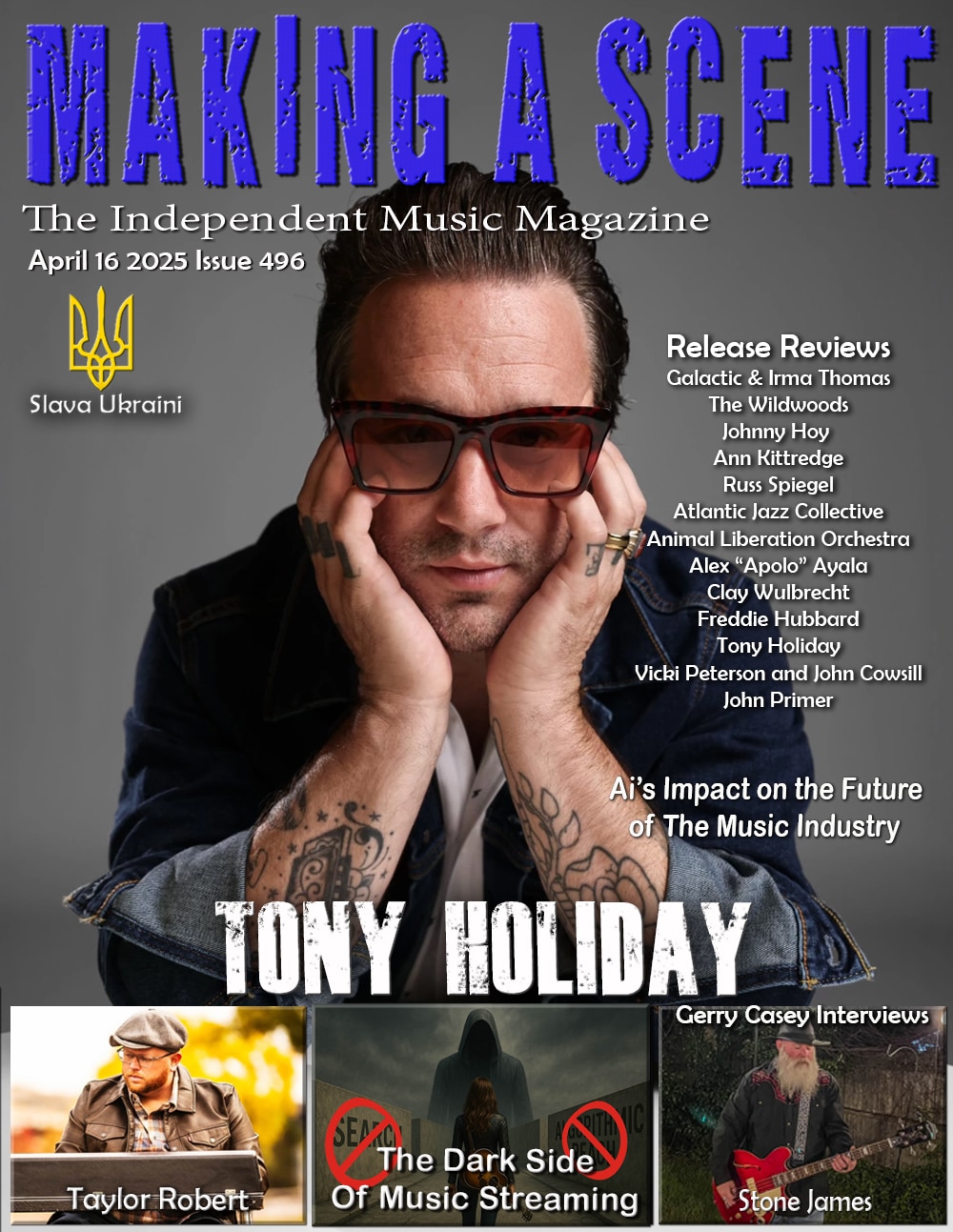Tobias Meinhart Sonic River
 Tobias Meinhart
Tobias Meinhart
Sonic River
Sonic River Records (in essence, self-released)
The album title and the metaphorical comparison of in-the-moment jazz to the flowing river is both an intriguing and rather logical concept. Saxophonist and composer Tobias Meinhart’s fifth album, Sonic River, uses the flow of water or the common expression “in the flow” as he relates jazz improvisation to the unexpected twists and turns of flowing water. Like that dynamic stream of water, as different rhythms or harmonies are introduced by different players, the music’s shape changes in real time. Interestingly, the title also reflects two aspects of Meinhart’s artistic identity: his upbringing near the Danube as well as his current daily commute over the East River. Water and rivers continue to be constants in his life. We should also mention that equating music to water is not necessarily new, considering albums from pianists Christian Sands, (Be Water) and Satoko Fujii (Gen – Altitude 1100 Meters) to name just two.
There’s also more involved with this release, as Meinhart also taps into literature, citing writers such as David Foster Wallace, Paul Auster, Rainer Maria Rilke, and Alejandra Pizarnik. Meinhart suggests that music and literature both have a rhythm and a flow, thereby influencing each other in unexpected ways. So, in addition to his quintet of pianist Eden Ladin, guitarist Charles Altura, bassist Matt Penman, and drummer Obed Calvaire, spoken word and interpretations of poetry are delivered by vocalist Sara Serpa on two tracks.
Having first heard Meinhart with his German group, Berlin People, on the 2023 live album Dark Horse (with Kurt Rosenwinkel) I was impressed with Meinhart’s ferocity and aggression. Incidentally, the tune “Dark Horse” also appears as the closing track here. Sonic River moves in the other direction. It is far more meditative, yet it does have a plethora of intense, fierce moments too. Although Meinhart continues to split his time between Germany and New York, the latter has recently consumed much more of his time, and this group is his working quintet. Appropriately, the opener is entitled “This Is Water,” a tune constantly moving and shifting led by Meinhart’s tenor and Altura’s melodic guitar lines. “After the Rain” is an original, not the John Coltrane tune of the same name. It begins with Ladin’s ostinato on the piano and evolves into improvisational blowing from leader coupled with a bright piano flights. At the three minute mark, the quintet is joyously swinging, contrary to the implied meditation of the title. Instead, “Mr. Vertigo” initially begins as a mid tempo ballad, imbued by Altura (who plays on six of the ten tracks) but builds in intensity with Calvaire’s inventive cymbal work and Meinhart’s liquid clusters. The title track features the quartet (sans Altura) in a purely meditative piece that has Penman in a melodic pizzicato turn as well as gorgeous swirling soprano from Meinhart to Ladin’s beautifully comped chords.
“Fugue Y” has Ladin and Meinhart in a lively, somewhat repetitive motif, allowing room for Penman to emphatically state his case as well. Producer Matt Pierson advised Meinhart to do at least one cover not from the jazz canon. Thus, we have Lead Belly’s “Where Did You Sleep Last Night?” interpreted along the lines of Kurt Cobain’s unplugged version. Naturally Altura joins in to contribute bluesy lines but it’s Calvaire’s deft kit work that keeps this one glued. Prior to the guitarist’s solo, Meinhart enters his beast mode.
The mood changes to lilting waves of both music and vocals on “The Panther” and “Silencio” as Serpa joins. The former is a musical adaption of Rainer Maria Rilke’s poem of the same name, displayed in the album jacked in both German and English while “Silencio” owes to Alejandra Pizarnik and also appears similarly in the jacket. Altura’s presence brightens the first while, as you’d expect, the latter is far more contemplative with starkly beautiful pianism from Ladin and atmospheric tones from the guitarist framing Serpa’s wordless vocals.
The darting lines of Meinhart and Altura do justice to the title “Pinball” which also features some remarkable unison lines from both as well as their individual declarations. “Korean Chant” is the purest ballad in the program, handled gorgeously by Meinhart, Ladin, and a restrained bass-drum tandem. This studio version of “Dark Horse” differs from the live one in that the post-bop piece doesn’t have the terrific sax-guitar unison passages that highlighted the live one. Yet, we do hear that intense, fierce side of Meinhart described previously and Ladin’s ever glistening piano.
Of his five albums, this is Meinhart’s most fully realized work. He is in full command throughout a wide array of material with an elite cast in tow.
– Jim Hynes
BUY NOW
Buy Us a Cup of Coffee!
Join the movement in supporting Making a Scene, the premier independent resource for both emerging musicians and the dedicated fans who champion them.
We showcase this vibrant community that celebrates the raw talent and creative spirit driving the music industry forward. From insightful articles and in-depth interviews to exclusive content and insider tips, Making a Scene empowers artists to thrive and fans to discover their next favorite sound.
Together, let’s amplify the voices of independent musicians and forge unforgettable connections through the power of music
Make a one-time donation
Make a monthly donation
Make a yearly donation
Buy us a cup of Coffee!
Or enter a custom amount
Your contribution is appreciated.
Your contribution is appreciated.
Your contribution is appreciated.
DonateDonate monthlyDonate yearlyYou can donate directly through Paypal!
Subscribe to Our Newsletter
Discover more from Making A Scene!
Subscribe to get the latest posts sent to your email.














































